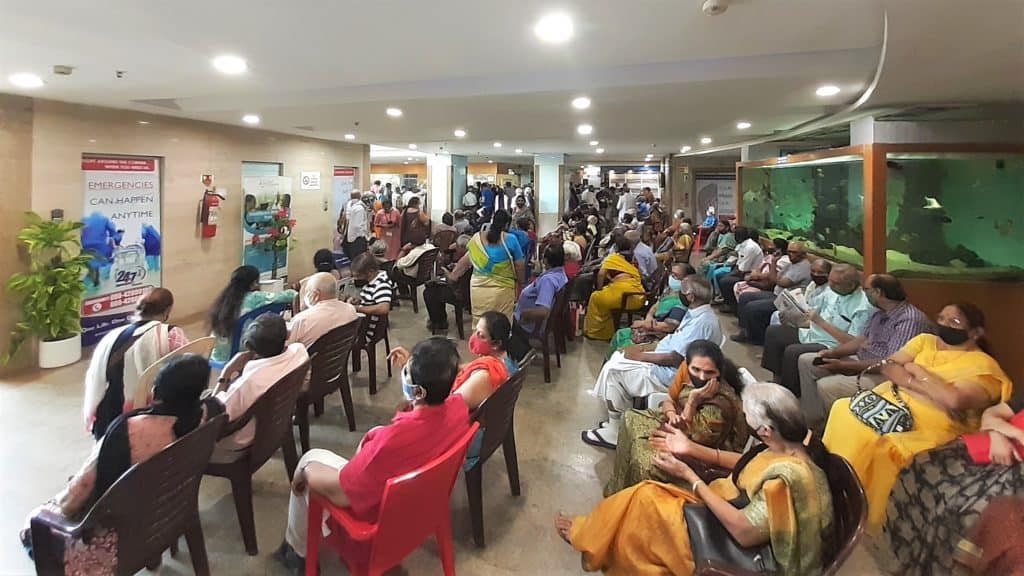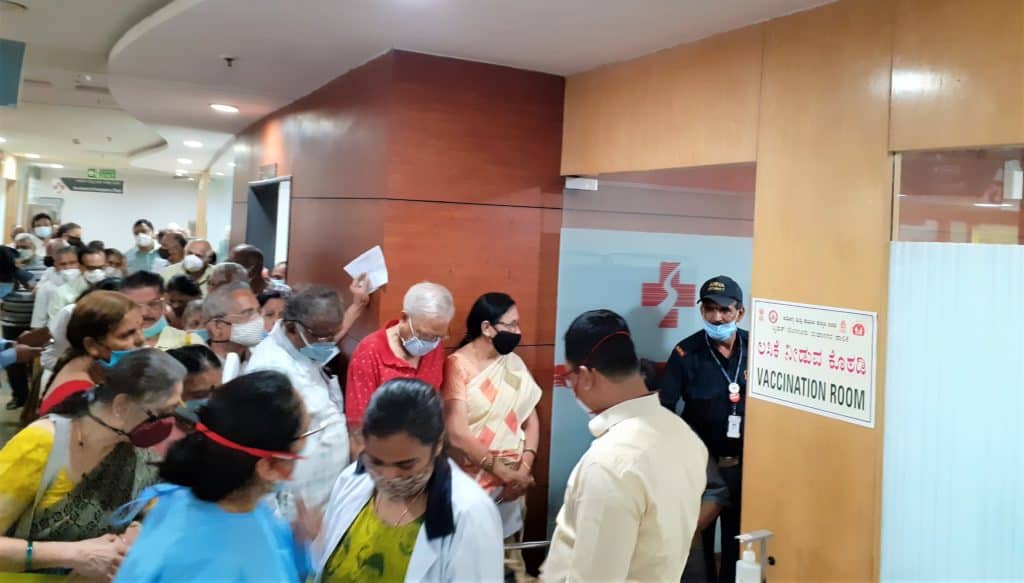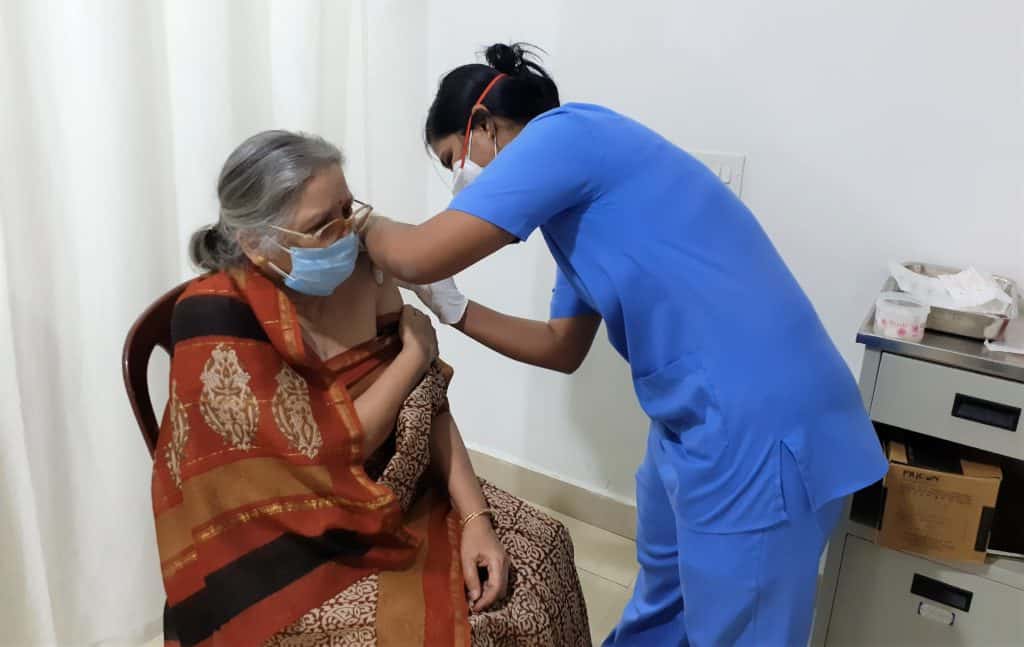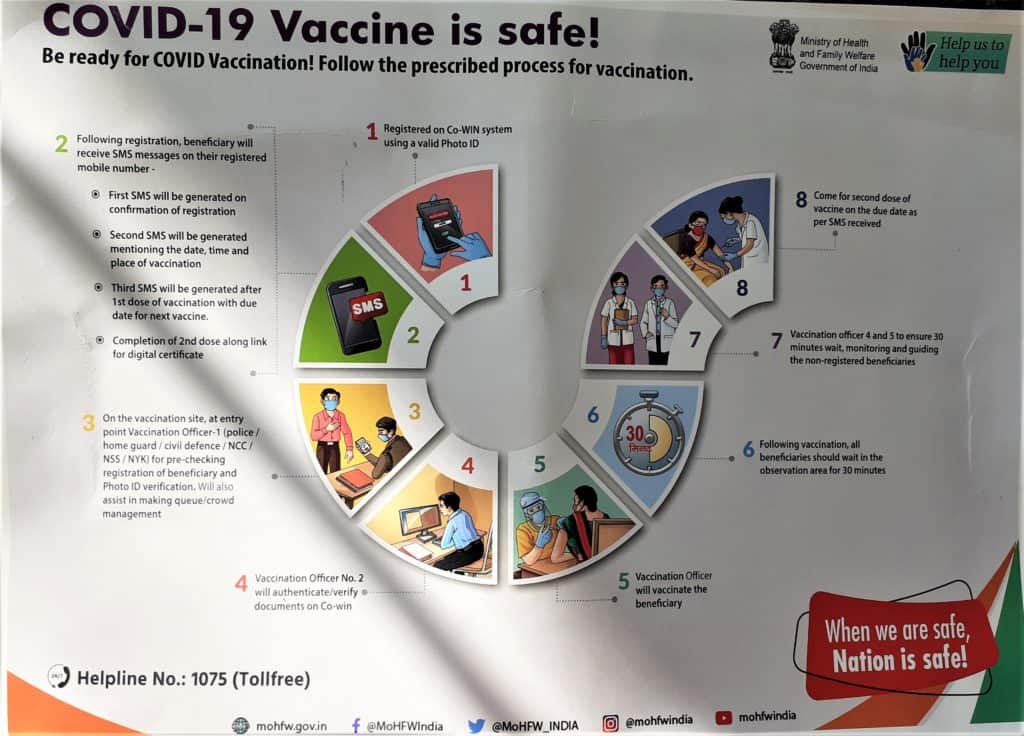Starting March 1, there has been much excitement among our senior citizens – and all because of the Covid vaccine. As one meme doing the social media rounds said, “Children take parents for vaccination!”
My parents got the Covid vaccine at Dayanand Sagar Hospital, Kumaraswamy Layout, Bengaluru, on 4th March 2021. They had registered on the Aarogya Setu app and managed to get an appointment after trying for several hours the previous day.
Those familiar with the process would be aware that beneficiaries are asked to select the hospital and date and then choose between “Forenoon” and “Afternoon” slots.
Read more: How’s the COVID scenario in Bengaluru now?
Even though my parents chose the “Forenoon” slot, they were given an all day time slot (10 am to 5 pm). They reached the hospital at 9:30 am and found around 100 people there before them. They had to re-register their names at the registration desk, where lists were being made in order of showing up.

There were three hand-written lists being made – one for those who registered online (online list) one for unregistered walk-ins (offline list) and one for the 45-59 age group with comorbidities. As it turned out, the offline list was shorter than the online one.
On “registering one’s presence” everyone was asked to wait for their names to be called out. The online and offline lists were served in parallel, which meant that no priority was given to those who took the trouble to register online and “book a slot”.
Read more: COVID-19 pandemic isn’t over yet, stay safe: Epidemiologist Giridhar Babu
There must have been about 400 people that morning, waiting along with their family members who accompanied them. Walking sticks, walkers and wheelchairs were a common sight. It was one big geriatric congregation. While there was little jostling, the place was quite crowded for comfort and social distancing was not really the norm.
After standing and sitting around for over two hours, my parents got their turn. Three computer systems were in place to check credentials and update the online CoWIN system. Then they had to go to the billing counter and pay Rs 250 each for the vaccine.
Next was the vaccination queue where they lined up again, this time standing. This wait was 30 min.

Vaccinations were being administered in two booths each operated by one nurse and one doctor overseeing things.

After the shot of Covishield, they were kept in an observation enclosure with around 30 others and some sort of social distancing.

By around 11:30 am, the number of registrations were already enough for the vaccine stock they had for the day, so the registration counter closed.
People who had made online appointments were walking in through the day and each time the staff had to explain the process they were following. Post lunch, the “Afternoon” slot people entered with print-outs of their booked appointments.
It was quite sad to see a 99-year-old gentleman and his 95-year-old wife (who were brought by one of their relatives) being sent off despite having a slot. There were arguments and fights as people were turned away and told to come back at 8 am the next day to put their names on the “paper” list.
The queues moved slowly. It seems that the server was “down” for brief periods in between, which didn’t help at all.
Our friends who reached an hour after my parents (around 10:30 am) spent most of their day in the cafeteria and taking walks to check on the progress. They received their shots only at 6 pm. From a glance of the lists, about 600 people are likely to have been vaccinated at the hospital that day.
My takeaways
If your family or friends are going to private hospitals, don’t expect the appointment process as specified by CoWIN to be followed. Each hospital follows its own process. Online registrations do not have priority and the hospitals entertain walk-ins without an appointment.
If you are lucky, you may finish quickly. I am aware that people in some areas walked into hospitals without registration and were out in an hour. The problem is that currently, there is no way to know. You will have to do hospital-hopping to check.
In general, it looks like it is best to go early in the morning. It makes sense to register online using any of the acceptable IDs. Carry more than one verification ID with you. You can choose to register your name in the walk-in list if it is shorter. Plan for a long wait.
Once the vaccines are distributed more widely, across more hospitals, the rush would subside.
Do keep in mind however that in another month, people will need their second shots!

Also Read:
- Struggling to book or reschedule a slot for the COVID vaccine? Read this
- Get vaccinated, do not lower guard: What doctors are telling us
- “Vaccines will help those who get it, as well as those who can’t”
- Indoor walks, online meetings and more: How a senior citizen is beating lockdown monotony
[Disclaimer: This article is a citizen contribution. The views and experience expressed here are those of the individual writer(s) and do not reflect the position of Citizen Matters.]